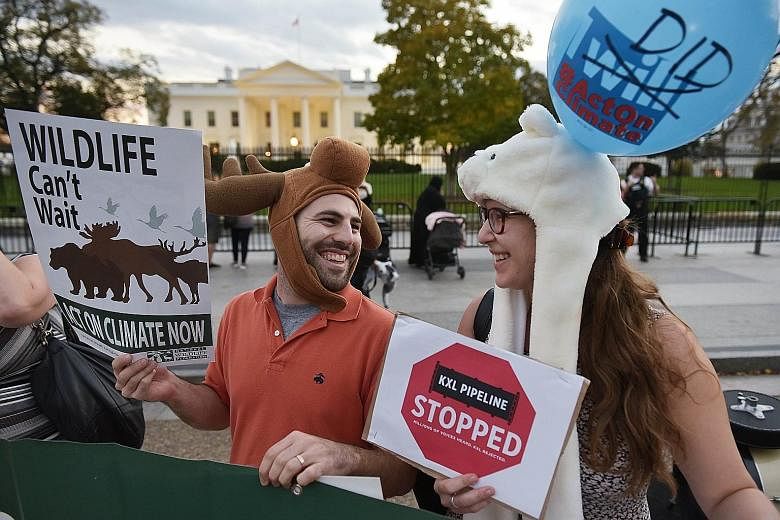WASHINGTON • President Barack Obama has announced that he has rejected the request from a Canadian company to build the Keystone XL oil pipeline, ending a seven-year review that had become a symbol of the debate over his climate policies.
Mr Obama's denial of the proposed 1,898km pipeline, which would have carried 800,000 barrels a day of carbon-heavy petroleum from the Canadian oil sands to the Gulf Coast, comes as he seeks to build an ambitious legacy on climate change.
The move was made ahead of a major United Nations summit meeting on climate change in Paris next month, when Mr Obama hopes to help broker a historic agreement committing the world's nations to enacting new policies to counter global warming.
While the rejection of the pipeline is largely symbolic, Mr Obama has sought to telegraph to other world leaders that the US is serious about acting on climate change.
The once-obscure Keystone project became a political symbol amid broader clashes over energy, climate change and the economy. The rejection of a single oil infrastructure project will have little impact on efforts to reduce greenhouse gas pollution, but the pipeline plan gained an outsized profile after environmental activists spent four years marching and rallying against it.
"It has become a symbol too often used as a campaign cudgel by both parties rather than a serious policy matter," Mr Obama said.
"And all of this obscured the fact that this pipeline would neither be a silver bullet for the economy, as was promised by some, nor the express lane to climate disaster proclaimed by others."
Both sides saw the Keystone rejection as a major symbolic step, a sign that the President was willing to risk angering a bipartisan majority of lawmakers in the pursuit of his environmental agenda. And both supporters and critics of Mr Obama saw the surprisingly powerful influence of environmental activists in the decision.
In citing his reason for the decision, Mr Obama noted the State Department findings that construction of the pipeline would not have created a significant number of jobs, lowered oil or gasoline prices or significantly reduced US dependence on foreign oil.
"From a market perspective, the industry can find a different way to move that oil," said Ms Christine Tezak, an energy market analyst at ClearView Energy Partners, a Washington firm. "How long it takes is just a result of oil prices. If prices go up, companies will get the oil out."
New Canadian Prime Minister Justin Trudeau, while supporting construction of the Keystone pipeline, has not made the issue central to Canada's relationship with the US.
NEW YORK TIMES

